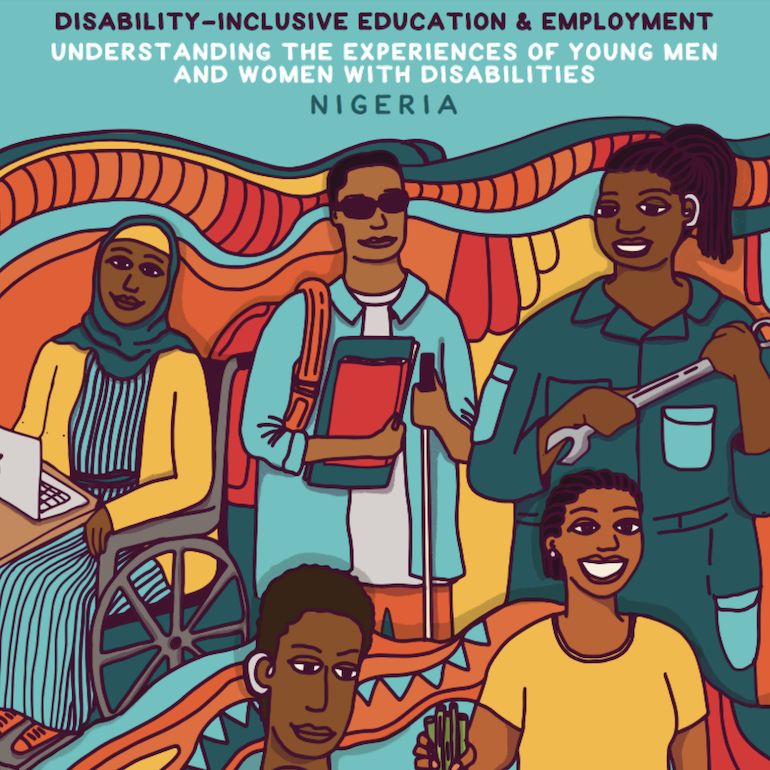
Disability-Inclusive Education and Employment: Understanding the Experiences of Young Men and Women with Disabilities – NIGERIA
Executive Summary
- This research explored the lived experiences of young men and women with disabilities in Nigeria through in-depth interviews with 30 young persons with disabilities. The study included a mix of participants with various disabilities (including physical, visual, hearing, psychosocial, and intellectual impairments, as well as albinism), aged between 15-35 years, based in urban and rural parts of Nigeria. Participants were purposively selected to reflect varied access to education and vocational training, employment in the agricultural and digital sector.
- Participants reported navigating numerous barriers in accessing education including identifying appropriate schools and managing the costs of education. Although funding support such as scholarships existed, there were eligibility restrictions that many found difficult to meet.
- Experiences of youth with disabilities during education were shaped by infrastructural inaccessibility and lack of accommodations in teaching practices.
- Most young people with disabilities faced challenges securing employment due to limited skills and employability training. Many then undertook vocational training but faced discriminatory attitudes.
- Youth with disabilities engaged in work in the agricultural sector faced challenges including those related to type of impairment and reported needing training in several aspects related to agriculture.
- Youth with disabilities engaged in the digital sector reported accessibility issues in their work environment and emphasised a need for financial support to help with the high cost of assistive products necessary for work in this sector.
- Access to assistive products and to digital skills training were noted as facilitating factors in education and employment. Support from family members, friends, peers, and community members were also strong enablers.
- Many youth participants had experienced stigma including negative attitudes and stereotypes, bullying, violence and abuse, and discrimination and exclusion in education and employment settings. Drivers of stigma included lack of awareness of the capabilities of youth with disabilities, and misconceptions around disability.
- This study also explored the intersectionality of other factors with youth experiences. The visibility of a person’s impairment can influence how they are perceived and treated by the community. Women with disabilities experience compounded discrimination as both disability and gender carry forms of marginalisation and stigma.
- The extent of voice and agency among the young people with disabilities varied with the type and severity of their impairment, household factors, and family dynamics.
- The evidence indicates a gap between young people with disabilities’ aspirations, and the opportunities available to them. These were mostly influenced by financial barriers.
- Recommendations include strengthening educational institutions and teachers to better deliver inclusive education; improving policy implementation to increase inclusiveness of persons with disabilities in education and employment; improving opportunities for young people with disabilities to access skills trainings; better availability of start-up capital and equipment to help transition to gainful employment; more efforts to sensitise employers and communities to address drivers of stigma; wider availability of assistive products and digital skills; and wider range of interventions and financial support options to better match the aspirations of young people with disabilities with opportunities.
About the Series:
“Disability-Inclusive Education and Employment”
Recognizing that meaningful inclusion for young people with disabilities starts with listening and learning, the Mastercard Foundation developed a research program to map the policy landscape and to hear directly from young people with disabilities.
This research was carried out in partnership with the International Centre for Evidence in Disability at the London School of Hygiene & Tropical Medicine (LSHTM), the University of Abuja, the University of Ghana, Lifetime Consulting Ltd, Addis Ababa University, University of Nairobi, Global Advocacy and Research Group and MRC/UVRI & LSHTM Uganda Research Group.
Two report series have been developed, covering the Mastercard Foundation’s seven countries of focus – the first on the context, the second elevating youth voices.
Briefs summarizing the key findings of each report have been prepared by Dr. Xanthe Hunt in collaboration with LSHTM and the Mastercard Foundation’s research team.


